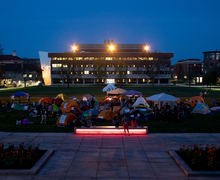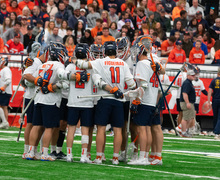Student Association : President to take on role as liaison to Board of Trustees
Student Association voted to stack another responsibility onto the job description of SA president Monday night, making the president an undergraduate liaison to Syracuse University’s Board of Trustees, the university’s top decision-making power.
Neal Casey, currently the chair of the Student Life Committee, will be the first president to absorb the position automatically and for the entire presidential term when he takes office in January. SA members debated for nearly 20 minutes before adding the responsibility.
President Jon Barnhart said the president represents the student body at every other level of the university and that this is ‘the next step.’ The president is currently guaranteed a position on the University Senate and each of SA’s committees.
Until Monday night, any undergraduate student could vie for one of the two positions as liaison to the Board of Trustees. The liaisons’ role is to report to the Board of Trustees’ executive board on the biggest issues facing undergraduate students and to report to SA on the university’s agenda. The liaison does not vote at the executive board’s meetings.
There are two undergraduate liaison positions and one graduate liaison position in SA. To be elected an undergraduate liaison, candidates originally needed to fill out a petition, collect 25 signatures, interview before SA and be elected by the Assembly. The bill passed Monday night did away with elections for one of the liaison seats, which will now be filled by the president. The other liaison seat will remain open to the student body.
The graduate liaison seat automatically goes to the president of the Graduate Student Organization. Barnhart and Casey currently hold the two undergraduate liaison positions, elected on a semester-by-semester basis.
Some SA members argued the Assembly should retain the power to elect the president as a liaison to act as a check to the president and that presidents should have the chance to opt out of the position because of its added pressure and time constraints to an already demanding job.
Comptroller Jeff Rickert said because the SA president is directly elected by the student body, SA should not need to elect him once again.
Casey said one of the main jobs of the president is to communicate students’ needs to the university. ‘What better outlet for the president than the Board of Trustees?’ he said.
Barnhart said he learned a ‘monstrous amount’ from the Board of Trustees.
‘If you don’t have that title of trustee or liaison, it’s much more difficult to communicate with them,’ he said.
Barnhart said the Board of Trustees is moving ‘up a curve’ of becoming student-oriented and making students’ welfare a priority. The board’s meetings helped him realize overcrowding on campus could affect dining halls and programs for special groups, such as transfer students, and resources, such as the Lillian and Emanuel Slutzker Center for International Services, he said.
The Board of Trustees typically meets once a month, usually over teleconference, and meets in person one or two times a semester.
SA also passed a bill Monday that will set aside 2.5 percent of the student activity fee starting in January, creating a student advancement fund that will provide a way for SA to fund student services as students request them.
SA’s student advancement fund is separate from its operating budget, which covers ‘day-to-day’ costs, including pens and paper.
The money could be put toward a bus to Wegmans and either Target or Walmart, Barnhart said. He said the money would go toward ‘things that are beneficial to the student body but that it doesn’t have money set aside for,’ such as RideShark, a forum for students commuting or traveling home on breaks to organize carpools. The fund would also be used for ‘once-in-a-lifetime experiences,’ such as political rallies, he said.
Students can make requests to the president to fund a project. The president brings it to SA’s cabinet or decides with SA’s faculty adviser whether to allocate the money when a decision needs to be made over the summer or before the next weekly cabinet meeting.
Barnhart said he is aware of the potential danger of the fund, as organizations may try to use it to win extra funding. He said SA has not set guidelines for how to determine whether a request is granted to receive money from the new fund.
Published on November 29, 2010 at 12:00 pm




